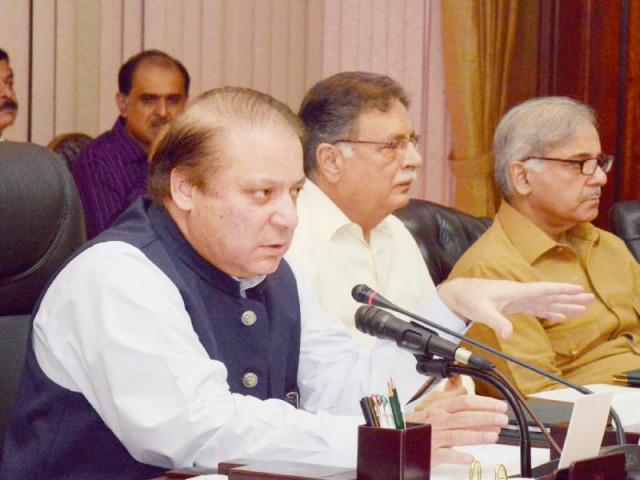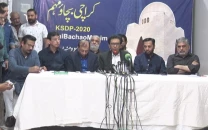Draft laid before: CCI Provinces seek time to examine energy policy
Blackouts to end within 3-4 years; tariff to be slashed to single-digit.

Prime Minister Nawaz Sharif briefs senior media persons on the new national energy policy following the CCI meeting. PHOTO: NNI
Energy-starved Pakistan is making frantic efforts to put an end to chronic blackouts which have slowed economic growth and discredited the previous administration.
Weeks before its installation, the Pakistan Muslim League-Nawaz government showed it was aware of the enormity of the situation. It promised elaborate measures but refused to give any timeframe for overcoming the energy crisis. It then waited for nearly three months, assessed the situation and studied all aspects of the problem carefully before unveiling its strategy.
On Tuesday, the draft energy policy was laid before the provinces at a meeting of the Council of Common Interests (CCI). The policy promises to end frequent outages within three to four years. The provinces, however, sought time from the federal government for analysing the policy.
The ministry of water and power briefed the CCI on the broad contours of the draft policy. The meeting was told that the government’s strategy focuses on the production of low-cost energy, restructuring of tariff, efficient technology, transparency and a merit-based system. The policy envisages elimination of transmission and distribution theft with the support of the provinces. It also seeks certain amendments to criminal laws – Pakistan Penal Code (PPC) and Criminal Procedure Code (CrPC) – to ensure punishment for electricity theft.
The draft policy calls for focusing load-shedding in the areas where recovery is low. “Pass legislation that allows disconnection of electricity to defaulters. Defaulters’ connections are severed after 60 days of non-payments and reconnect power with pre-paid card-based meters,” says the daft proposing steps to deal with financial losses in the system.
The distribution losses, which account for 25% to 28%, and electricity theft, which amounts to Rs140 billion per annum, are the major causes of the shortfall.
Under the proposed strategy, ‘smart meters’ will be installed at feeders across the country. Once the policy is approved, the project will be completed within 60 days. The water and power ministry says 90% of the work has already been completed. It will help manage profit and loss accounts at the feeder level and hold Wapda XEN accountable for any losses.
The policy proposes privatisation of a limited number of distribution companies (DISCOs) on a pilot project, development of the profit and loss of the remaining DISCOs and ultimately their privatisation.
Apart from some power conservation measures, the government also intends to phase out subsidies within three years and pass on the economic cost of power generation to consumers. It also plans to provide more expensive but uninterrupted electricity to heavy users in commercial and residential sectors. Under the plan, the government wants to introduce ‘time of use meters’ that charge different rates for peak and off-peak hours.
In his address to the CCI meeting, Prime Minister Nawaz Sharif underscored the need for concerted efforts to resolve the delibitating issue.
He said the power issue needs a policy which encompasses all dimensions and it also needs a strong will by the federal government as well as the federating units to make it successful. “The provinces’ role is crucial in making the policy a success,” he was quoted as telling the meeting’s participants.
According to his media office, the prime minister listed the demand and supply gap, lack of affordability, inefficiency and pilferage of electricity as the major problems in the power sector. Major changes will be made in the system to overcome these issues, he added.
The premier said that Pakistan was producing 45% of electricity with furnace oil which is too expensive for power generation and has led to higher tariffs. “The prime minister told [the meeting] that we plan to end load shedding within next 3-4 years through a multi-pronged strategy” according to an official handout.
Low-cost energy will be produced by using coal-powered and hydel power plants. The extraction of coal and development of the infrastructure for power production will be carried out simultaneously to save time. Till such time that the local coal is available, it will be imported. Run of the river projects are being initiated to overcome the short-term demands while large dams, including Bunji Dam and Bhasha Dam, will also be constructed to overcome the needs of irrigation water as well as the power shortages.
Similarly, the strategy foresees bringing down the power tariff to single digit within three years. The tariff restructuring is the main feature of the new policy through which the subsidies will be gradually rationalised. Consumers using up to 200 units per day will be provided subsidies.
The mismanagement and inefficiency of Wapda and other concerned departments is responsible for the power crisis, the premier said. “It is because of them that we are facing this situation today. They have failed miserably to maintain the system and today our distribution lines cannot bear the burden.”
He added that 1,400 megawatts of electricity could be added to the system within a year only through proper maintenance of the system.
Premier Nawaz told the meeting that the government has to take the lead in power projects implementation strategy. He announced the construction of a Gaddani energy corridor which will provide services to investors for power production. “It will be a hub for electricity generation,” he added.
The meeting was attended by the four provincial chief ministers, some federal ministers and other senior officials. The chief ministers appreciated the draft policy but asked for time to analyse it. The prime minister directed that a committee be formed, comprising the four provincial chief secretaries and one nominee of each province, to submit their report within a week.
Published in The Express Tribune, July 24th, 2013.



















COMMENTS
Comments are moderated and generally will be posted if they are on-topic and not abusive.
For more information, please see our Comments FAQ